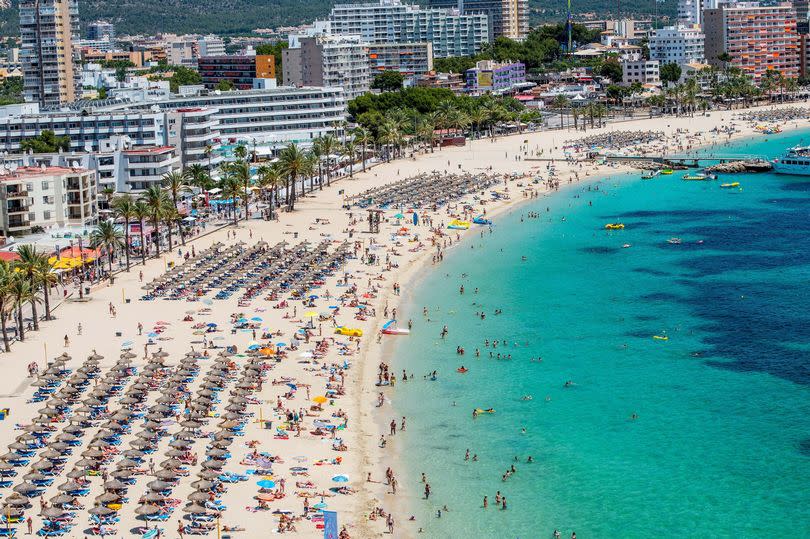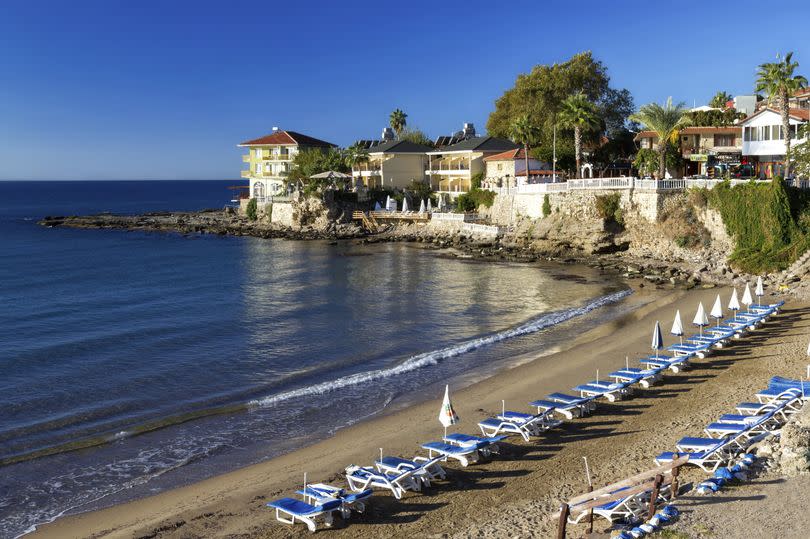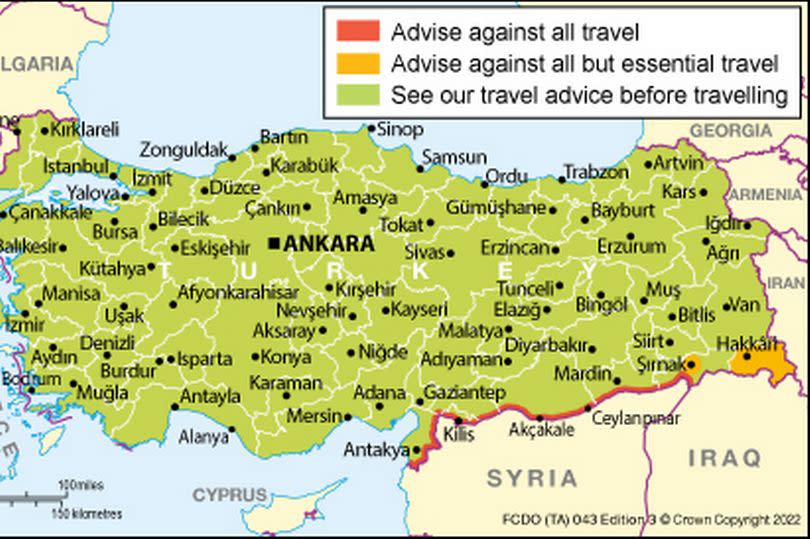Canary Islands, Greece and Turkey travel advice as protests sweep holiday resorts

The seemingly never-ending wet weather has many of us dreaming of sunnier climes, but as the UK continues to grapple with man-made climate change, our favourite holiday destinations are also feeling the effects. Take the Canary Islands for example, where recently tens of thousands of protestors took to the streets of Tenerife, demanding a temporary cap on tourist numbers.
The Foreign and Commonwealth Office (FCO) provides travel advice for UK citizens heading to all countries, including Greece, Spain and Turkey. While most trips to these countries go off without a hitch, it's always worth familiarising yourself with the latest advice.
In recent weeks, the protests in the Canary Islands have been making headlines. The slogan CanariasTieneUneLimit, or 'The Canary islands have a limit', was prominently displayed on the placards and signs of demonstrators. Clips depicting thousands of protesters ardently chanting: "Si vivimos del turismo por que no somos ricos? (If we live from tourism then why aren't we rich?) were widely circulated on various digital platforms, reports Wales Online.
Read more: Ministers can't U-turn on all 20mph roads in Wales for alarming reason
Read next: DPD delivery driver reversed down one-way Welsh street and killed pedestrian
Tenerife is one of Spain's beloved destinations - over 5.8 million local and international visitors flooded to the island in 2022. In total, the Canary Islands, with a population of around 2.2 million, played host to more than 12 million visitors in that same year.
Studies conducted by Spanish finance firm CaixaBank reveal the heavy reliance of the Canary Islands on the tourism industry. In 2023, overseas tourists injected more than £17.4 billion into the regions economy, which constituted about 19 per cent of their total spend across Spain and contributed approximately 25 per cent to the Canary Islands' GDP.
North Wales Live has launched a WhatsApp community group where you can get the latest stories delivered straight to your phone
Since the Canary Islands are under Spanish sovereignty, the FCO has not provided specific guidelines for these islands. However, you can view the comprehensive advice for Spain, which pertains to them, below.
Spain

Beware of potential terrorism in Spain. Be alert to the likelihood of terrorist attempts in Spain.
These attacks may be random and can include locations frequented by foreigners. Maintain awareness of your surroundings, stay informed through local media updates and follow instructions from local authorities.
Recent terrorism incidents in Spain:. Take precautions to guard your valuables.
While most trips to Spain are without incident, it's important to stay vigilant against street crime. Criminals often employ distraction methods and usually operate in groups.
Be mindful of your passports, cash, and personal items, particularly when handling luggage at the airport or organising car rental.
Avoid keeping all your valuables in one location. Maintain a photocopy or digital copy of your passport in a secure place.
Ensure your accommodation has sufficient security measures. Secure all doors and windows during the night or when you're out.
If you have concerns about the safety of your lodging, consult with your travel agent or property owner.
Vehicle Crime
Foreign-registered and rental cars, especially those towing caravans, are prime targets for 'highway pirates'. They may attempt to force you to pull over, alleging that there's an issue with your vehicle or that you've damaged theirs.
If you choose to stop to inspect a vehicle, do so in a well-lit public area like a service station. Be cautious of strangers offering assistance.
When driving, be cautious of individuals posing as plain-clothed police officers in unmarked cars. Typically, traffic-related matters are handled by uniformed officers.
All police officers, including those in plain clothes, carry official ID. Unmarked police vehicles have a flashing electronic sign on the rear window which reads Police ('Policia') or Civil Guard ('Guardia Civil'), and may use blue flashing lights.
Genuine police officers will only ask you to show them your documents and will not ask for your bag or wallet.
Attacks and sexual assault
While attacks, including sexual assaults, are rare, they do occur. See Get help if you are a victim of crime abroad.
It's advisable not to separate from your group, never leave drinks unattended and avoid going off with strangers. Save the location of your accommodation on your maps app, so it's easy to find.
See TravelAware 'Stick with your mates' for tips and advice.
Drink and food spiking
Stay alert to the potential use of 'date rape' and other drugs including GHB and liquid ecstasy.
Purchase your own drinks and always keep them in sight to prevent them from being spiked. Alcohol and drugs can lower your vigilance, making you less in control.
If you drink, know your limit. Drinks served in bars in Spain are often stronger than those in the UK.
Scams
Beware of thieves masquerading as police officers who may request to inspect your wallet under the guise of identification. Real police officers will ask for ID, but they won't demand to see wallets or purses.

Personal ID
If a police officer requests it, you must present photo ID. This applies to the Guardia Civil and national, regional and local police forces.
If your identity is in question, the police have the right to detain you at a police station until it's confirmed. Ignoring a direct order from a police officer can be deemed 'disobedience', which is a criminal offence.
Hotels, tourist lodgings and car rental companies are legally obliged to register the passport details of tourists upon check-in or vehicle collection.
When checking into your accommodation, ensure hotel staff have registered your passport details or taken a photocopy before leaving reception. Do not leave your passport behind to collect later.
You might need to show ID when making purchases with credit or debit cards. A driving licence or a photocopy of your passport might be accepted, but you may be asked to present your original passport.
Alcohol laws and bans
In certain areas of Spain, consuming alcohol in the street is prohibited. You could be fined on the spot.
There are stringent controls on drinking and sexual activity in public places, including beaches.
Alcohol laws in the Balearic Islands.
Local laws restrict the sale and availability of alcohol in parts of some resorts on the islands of:.
This prohibits:.
Hotels and other venues are required to evict guests who engage in dangerous behaviour on balconies. Both the guest and the venue can be fined for such actions.
Illegal drugs and prison sentences
Even possession of a small amount of drugs can lead to arrest and detention. If you're caught with large quantities, you're likely to face prosecution and a prison sentence.
Illegal commercial parties in villas and private homes.
There have been several serious accidents involving individuals attending illegally promoted commercial parties in villas and private homes on the islands of Ibiza and Mallorca.
Dress
In certain areas of Spain, it's illegal to walk around in public wearing only a bikini or swimming shorts. It's also against the law in some places to be shirtless.
If you're caught wearing swimwear on the seafront promenade or nearby streets, you could be fined.

For security reasons, some public authorities in Spain do not permit the burka or niqab to be worn in their buildings. If you visit town council buildings wearing a burka or niqab, you may be asked to remove it while inside.
LGBT+.
Spain is generally a welcoming and forward-thinking destination for LGBT+ travellers. There are vibrant LGBT+ communities and social venues, especially in larger cities.
Same-sex marriage has been legal in Spain since 2005. Since 2007, transgender individuals have been able to register under their chosen sex on public documents such as birth certificates, identity cards and passports without the need for prior gender reassignment surgery.
Spain does not recognise a third gender.
Falls from height
There have been several severe accidents (some fatal) due to falls from heights, including balconies. Many of these accidents have involved British nationals and have had a devastating effect on those involved and their families.
Avoid taking unnecessary risks around balconies or other high places, particularly if you're under the influence of alcohol or drugs. If your room has a balcony, heed the safety advice and keep an eye on friends who may be at risk.
In some regions, you could face fines or eviction from your hotel if found behaving irresponsibly around balconies. Your travel insurance may not cover incidents that occur on a balcony or if you were under the influence of alcohol or drugs when the incident occurred.
Taxis
Ensure you only use official registered or licensed taxis, or reputable transport companies that you recognise. Licensing regulations vary across Spain and in certain cities pre-booking is required.
Passengers who utilise unlicensed taxi services could face penalties up to 600 Euros. Ensure your taxi or airport transfer is booked through a licensed company.
Road Travel.
In 2021, Spain recorded 1,508 road fatalities (source: Department for Transport). This translates to 32 road deaths per million population, compared to the UK's average of 24 road deaths per million population in 2021.
Licences and Permits
To operate a car or a motorcycle over 125cc in Spain, you must be at least 18 years old. For motorcycles up to 125cc, the minimum age is 16.
It's mandatory to carry a valid driving licence and ID at all times.
If you're visiting Spain, your full UK driving licence is acceptable. Provisional licences are not recognised for driving in Spain.
If you're using UK insurance, always have your certificate with you in case you're stopped. Verify that your UK insurance covers you for driving in Spain, and for what duration.
Typically, this certificate is only valid for less than 3 months stay.
Driving a British Car Abroad
You might need a UK sticker to drive your car outside the UK. In 2021, UK stickers replaced GB stickers.
Visit the GOV. UK Displaying number plates website for more details if you're driving outside the UK.
Driving Regulations.
In Spain, motorists drive on the right-hand side of the road. The driving rules and customs differ from those in the UK.
Motorists are required to carry two red warning triangles which should be placed at least 50 metres in front and behind the vehicle in case of an accident or breakdown. Additionally, a spare wheel and the necessary tools for changing it must be on hand.
If you exit your vehicle during an accident or breakdown, or while awaiting emergency services, a reflective vest must be worn to avoid fines.
Spain enforces stringent drink-driving laws, with police frequently conducting roadside checks for alcohol and drugs. Offenders can expect penalties ranging from fines to licence suspension and even imprisonment.
On-the-spot fines can be issued by police for various driving offences, including speeding. If the fine is accepted and paid within 20 days, it will be reduced by 50%.
Further information on payment methods can be found on the Spanish driving agency's website.
Using a mobile phone while driving is illegal, even if you have pulled over to the side of the road. You must be completely off the road.
The use of earpieces is also prohibited. Only fully hands-free units are permitted.
Low emission zones
Certain urban areas in Spain have implemented permanent low emission zones ('Zonas de bajas emisiones' ZBE), where only vehicles meeting specific exhaust emission standards and displaying an air pollution sticker are allowed entry. Although air pollution stickers cannot be issued to vehicles with foreign registration plates, some cities require you to register your vehicle prior to travel if you wish to enter a low emission zone (eg Barcelona).
It is advised to check with local authorities before travelling for information on local regulations and requirements for vehicles registered outside of Spain.
Extreme temperatures can affect many regions of Spain during the summer months. For severe weather warnings and updates, visit the Spanish Meteorological Office (AEMET) and European Meteorological Services website.
Greece

Greece, the cradle of democracy and home to some of Europe's most stunning islands, is a top destination for Welsh travellers. Here are all the issues you need to be aware of before you travel:.
Terrorism in Greece.
There is a likelihood of terrorist attacks in Greece. Attacks could be indiscriminate, including in places frequented by foreigners.
Several attacks involving explosives and automatic weapons have been launched against Greek institutions, shopping malls, banks, media offices, diplomatic premises and the police. While British nationals are not typically targeted, attacks could occur in areas frequented by tourists.
Political Demonstrations.
In light of events in Israel and the Occupied Palestinian Territories, Greek authorities have heightened security at notable locations, including tourist sites. It's advised to stay alert, avoid demonstrations and heed the advice of local authorities.
Strikes and Demonstrations.
Frequent strikes, often announced at short notice, can disrupt public transport (including air travel and ports), road networks and borders. Political demonstrations also occur regularly.
It's recommended to steer clear of demonstrations wherever possible and follow the guidance of local authorities. Some past demonstrations have escalated into violence.
If you unexpectedly find yourself near a demonstration, retreat to the last known safe place. Security forces frequently use tear gas to disperse demonstrations, which can affect your breathing and vision.
Frequent protests occur in central Athens, particularly around Syntagma Square. Currently, there is an increased risk of demonstrations due to events in Israel and the Occupied Palestinian Territories.
Nationwide strikes and protests can happen unexpectedly and may disrupt travel by road, air, and sea, as well as cause delays or diversions at border crossings.
Demonstrations can occur without warning, with traditional dates being 1 May, 17 November, and 6 December.
Theft
Passport, wallet, and handbag thefts are common on the metro and in crowded tourist spots, especially in central Athens. Avoid carrying all your valuables in one place and keep a photocopy or scanned copy of your passport in a safe place.
Maintain the same level of personal security awareness as you would in the UK.
When driving, keep your valuables hidden and always lock your vehicle. Always park in a well-lit area or secure car park.
Be vigilant against car crime.
Sexual assault
Sexual assaults and personal attacks can occur in Greece, including attacks on foreign visitors in tourist areas and cities.
The FCO advises all travellers to report anything suspicious immediately to local authorities or hospitality management.
Personal ID.
Always carry a copy of your passport or other photographic ID confirming British nationality, as this is a legal requirement.
Race.
While most visitors encounter no race-related issues, there have been instances of racially motivated attacks, particularly in inner-city areas.
Public offences.
Rowdy or indecent behaviour, especially involving excessive drinking, is not tolerated by the Greek police. Such behaviour could be deemed illegal, leading to arrests and potentially heavy fines or prison sentences from the courts.
Certain fancy dress costumes may be considered offensive and thus against decency laws. Be aware that your travel insurance may not cover you if you've been drinking.
Drugs
Possession of even small amounts of illegal drugs can result in a lengthy prison sentence. Alcohol, drugs and nitrous oxide can impair your alertness, control and awareness of your surroundings.
The purchase or sale of nitrous oxide for recreational use is illegal in Greece. Possession can lead to arrest or fines.
Public transport.
On some public transport, it may be necessary to time stamp or validate your ticket for it to be valid. Check with local providers.
LGBT+ travellers.
Same-sex relationships are legal in Greece, with civil unions between same-sex couples being recognised since 2015 and same-sex marriage legalised as of February 2024. The age of consent stands at 15, applicable to both same-sex and opposite-sex partners.
Transgender individuals have the right to legally change their gender. Laws against discrimination and hate speech extend to cover gender identity.
However, public attitudes towards same-sex relationships can vary across the country. Public displays of affection by same-sex couples may not be well-received, particularly in rural areas.
In contrast, the capital city of Athens and several Greek islands, notably Lesvos, Mykonos and Skiathos, tend to be more accepting.
Regarding photography, it is illegal to approach or capture images or videos of military installations, vehicles or structures at any time. Anyone found doing so risks arrest and potential prosecution by Greek authorities.
Certain border regions are also considered sensitive from a military perspective. While these areas can be visited, refrain from taking photographs or recording videos.
For those planning to drive during their stay in Greece, refer to information on driving abroad and consult the RAC guide.
When hiring a vehicle, ensure it's in tip-top shape and that you're fully insured. Be aware that insurance provided by rental companies for mopeds or quad bikes often only covers third-party damage, meaning you might be liable for any harm to the vehicle itself, potentially facing hefty costs or even arrest if the company decides to take legal action.
Navigating the bustling, rapid traffic of Greece's larger cities requires extra vigilance. Always use designated crossings as a pedestrian, but proceed with caution; drivers may not always stop, despite their obligation to do so, and sometimes cars are allowed to turn right onto crossings even when the pedestrian signal is green.
In light of recent adverse weather, some regions are grappling with flooding. Conditions can deteriorate rapidly, so stay updated by following "112 Greece" on X (formerly known as Twitter ) for the latest official information.
Wildfires are currently raging across various parts of Greece, including inhabited areas on the mainland and islands. These fires are unpredictable and dangerous, with situations evolving swiftly.
Keep informed of developments by following "112 Greece" on X.
Starting a forest fire is considered a criminal act in Greece, regardless of intent. In case you spot a wildfire, immediately contact emergency services at 112.
Greece is prone to seismic activity, including earthquakes and tremors. It's important to
Turkey

Turkey, a favourite among history enthusiasts and sun-seekers alike, has a few key points travellers should be aware of before embarking on their journey:.
Terrorism in Turkey.
The likelihood of terrorist attacks in Turkey is high. The majority of these attacks have taken place in southeast Turkey, Ankara, and Istanbul.
It's crucial to stay alert, keep abreast of local news reports, and heed the advice of local authorities.
Attacks could occur indiscriminately, including in areas frequented by tourists, such as:.
Istanbul has been the site of several significant recent attacks:.
Extremist groups based in Syria, including Daesh and Al-Qaeda linked groups, possess the capability to execute attacks in neighbouring countries, including Turkey. Daesh has previously targeted border crossings and nearby locations on the Syrian side of the border.
Political situation.
Sporadic demonstrations can take place in cities and may escalate into violence. Police have resorted to tear gas and water cannons to disperse protests.
Events in Israel and the Occupied Palestinian Territories have led to increased tensions in the region, with ongoing demonstrations across Turkey. Large protests have been reported outside diplomatic missions related to the conflict in major cities, particularly Israeli diplomatic missions in Ankara and Istanbul.
Avoid all demonstrations and vacate the area if one develops. Local transport routes may be disrupted.
Street muggings and pickpocketing.
Street muggings and pick-pocketing are rife in the major tourist hotspots of Istanbul. Be vigilant with your personal belongings and ensure they are always secure.
Spiked food and drinks.
Purchase your own beverages and keep them within sight to avoid them being spiked. Be cautious of strangers who approach you offering food and drink (which could be drugged), money exchange services, or invitations to a restaurant or nightclub.
Fake alcohol.
In a handful of instances, fake alcohol has resulted in the deaths of tourists. If you have any doubts, seek guidance from your tour operator or the Turkish authorities.
Sexual attacks
In 2023, British consular staff in Turkey were informed of 42 cases of sexual assault, including rape. The majority of sexual assault cases reported to British consular staff in Turkey occurred during summer holidays in coastal tourist regions.
Many were perpetrated at night by individuals the victim had met during the day, including hotel employees. There have also been sexual assaults on minors visiting toilet facilities unaccompanied.
Exercise extra caution in these situations.
Vehicle safety.
Accepting rides from strangers can pose a risk. Opt for a registered taxi and make a note of the registration number before getting in.
Personal ID.
In Turkey, it's against the law not to carry some form of photographic ID. You should always have your passport or residence permit on you.
Particularly in bustling areas like Istanbul, authorities may stop individuals for ID checks. There are also numerous police checkpoints on main roads throughout Turkey.
It's important to cooperate with officials conducting these checks.
When visiting mosques or religious shrines, it's advised to dress modestly to avoid causing offence.
There have been instances of tourists being urged to file a claim for personal injury if they've suffered from gastric illness while in Turkey. If you've experienced a personal injury, you can find out what steps to take on the Citizens Advice website.
However, only make a claim if you've genuinely been injured or ill. Making a false or fraudulent claim could result in legal action in either the UK or Turkey.
Smoking is prohibited on public transport and in all indoor workplaces and public places. There are also restrictions on smoking in certain outdoor areas where cultural, artistic, sports or entertainment activities take place.
Turkey enforces strict laws against the use, possession and trafficking of illegal drugs. If found guilty, you could face a fine or a prison sentence ranging from 4 to 24 years.
Stray dogs
Most towns and cities have stray dogs. Packs congregate in parks and wastelands and can be aggressive.
Take care and do not approach stray dogs. If you're bitten, get medical advice immediately.
Rabies and other animal borne diseases are present in Turkey.
Sale of antiquities.
The possession, sale and export of antiquities is illegal. You could be fined and receive a prison sentence of 5 to 12 years.
Some historical items found at local markets and in antique shops can be sold within Turkey but are illegal to export. Confirm the legal requirements before purchasing or exporting such items.
Using cameras.
Do not take photographs near military or official installations. Ask for permission before photographing people.
LGBT+ travellers.
Comments about the nation and flag.
It is illegal to insult the Turkish nation, state or the national flag, or to deface Turkish currency. These laws can also apply to comments or images online wherever they were uploaded.
Offences under these laws carry a penalty in Turkey of a prison sentence of between 6 months and 3 years.
Road travel
If you are planning to drive in Turkey, see information on driving abroad. You must carry a green card in Turkey.
Road users, especially those travelling at night, are advised to exercise caution. Approach checkpoints slowly and adhere to the instructions of security personnel.
While roads between major cities are generally in excellent condition, they can be poor in remote, rural areas. Accidents are common and are mainly due to poor or reckless driving.
Motorcycle and moped riders are reminded that it is illegal not to wear a helmet. Non-compliance may result in a hefty fine.
Drunk driving is strictly prohibited. Offenders face police fines and could have their licence confiscated for 6 months.
Forest fires are a common occurrence in Turkey during the summer. Extra care should be taken when visiting or driving through woodland areas.
Lighting a fire of any kind in forbidden areas, including barbeques and discarding cigarette butts in the woods, could lead to a fine or prison sentence.
In the event of a forest fire in your area, local authorities may instruct you to evacuate your accommodation. Always follow the directions of local authorities.
If you witness a forest fire, immediately call emergency services on 112.
Severe rainstorms can cause flooding and landslides across Turkey. Roads may become impassable and bridges damaged, making travel difficult and reducing essential services.
If you're in an affected area:.
Earthquakes are a regular occurrence in many parts of Turkey. These can be of high magnitude, causing damage to infrastructure and posing a risk to life.
In February 2023, a devastating earthquake of 7.8 magnitude struck Gaziantep and its surrounding provinces in south-east Turkey. The region, still heavily damaged, may continue to experience strong earthquakes.
Areas where FCDO advises against travel.

Border with Syria
The FCDO strongly advises against all travel within a 10km radius of the border with Syria.
Sirnak (city).
The FCDO recommends avoiding all but essential travel to the city of Sirnak.
Hakkari province.
All but essential travel to Hakkari province is advised against by the FCDO.
Find out what's happening on the roads near you

 Yahoo News
Yahoo News 
